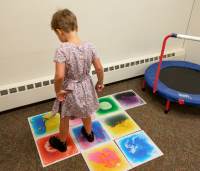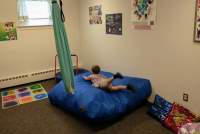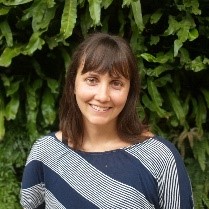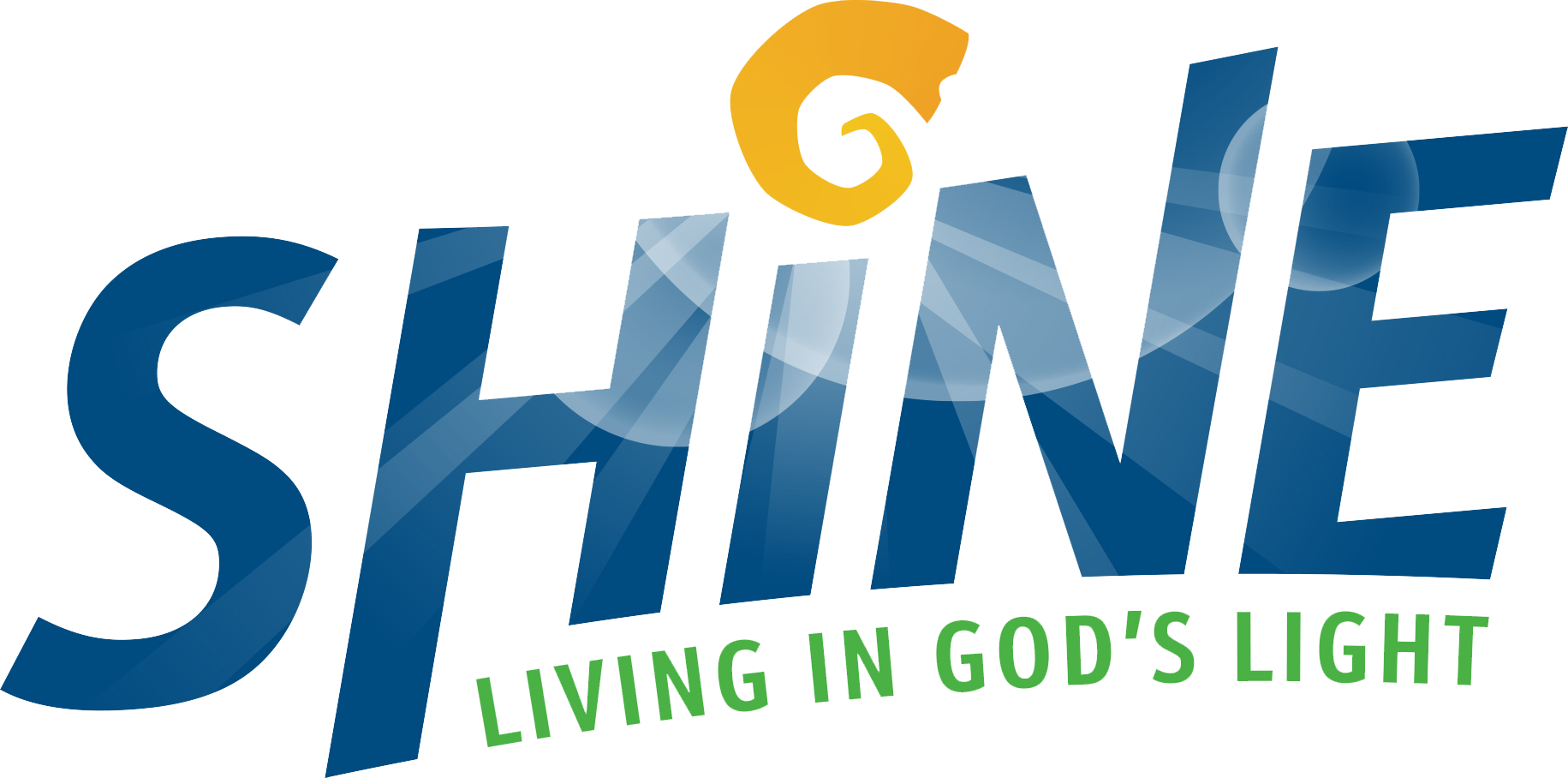As our faith formation program returned to in-person programming a couple of years ago, it was clear that there were a number of very energetic, active children. These children needed particular attention and structure to help nurture their participation in Sunday school. Teachers of these students began to take their classes outside more and started each class with a game or a movement activity (helpful for most kids coming to Sunday school after 85+ minutes of worship!). We are grateful that, each week, the Shine curriculum offers fun, thoughtful movement suggestions.
It was also clear that our program could do more to support teachers, children, and their families in building an inclusive faith formation community.
 A number of children in our congregation are neurodivergent, which means having developmental or neurological function that differs from what is considered “typical.” In our church, this includes diagnoses like ADHD and autism. Recognizing that the systems and structures within a place are what disable people and are barriers to their full participation, we wanted more support to be able to build community with children of a variety of abilities and brains. We first reached out to the Anabaptist Disabilities Network (ADN) for consultation.
A number of children in our congregation are neurodivergent, which means having developmental or neurological function that differs from what is considered “typical.” In our church, this includes diagnoses like ADHD and autism. Recognizing that the systems and structures within a place are what disable people and are barriers to their full participation, we wanted more support to be able to build community with children of a variety of abilities and brains. We first reached out to the Anabaptist Disabilities Network (ADN) for consultation.
When meeting with Jeanne Davies, the Executive Director of ADN, she opened by saying, “We believe that the whole church is better when all people are welcome and everybody belongs, including people with disabilities . . .
“All week long, kids are in places where people are trying to fix them—parents, schools, and therapists trying to make them typical. As much as we can, while still keeping everyone safe and getting along as a group, let kids be the way they are while they are at church. We’re not trying to do therapy; we’re just trying to love them. People are not problems to be solved; they are our brothers and sisters to be loved.”
Tips for Supporting Neurodiverse Children
These words have helped to set the tone as we’ve focused on building and deepening inclusive community in our faith formation program. The following tips, offered from or inspired by our consultation with ADN, were discussed among Sunday school teachers at our annual orientation meeting, and then implemented:
- Sunday school registration questions: We expanded the space for families to respond about allergies, dietary needs, medical conditions, diagnoses, and medications. We also added a space for “Important information to know about your child to help them feel welcome and engaged (triggers, effective calming strategies, challenges).”
- Provide social ramps: Those of us who have good social skills can help those who don’t. Ask safe questions to engage children (for example, asking about pets or breakfast).
- Look for kids’ gifts: Everyone wants to serve and be valued. Give kids a job (for example, helping to pass out snack, running to get supplies, setting up “Follow the Story” cards).
- Allow drawing or appropriate use of fidgets while the lesson is going on. This can help some kids to pay attention better.
- Allow kids space to move around and/or to stim. Stimming is a self-stimulating repetitive, often protective behavior (for example, tapping, rocking, or humming).
- Use when/then for challenging behaviors: “When ___ (hoped-for behavior), then we can ___ (preferred activity/start the activity).”
- Don’t pressure someone to look you in the face. If they are avoiding your gaze, look to their side, which is less intense.
- Normalize “unusual” behavior. Acting outside the social norms is okay as long as no one is getting hurt. Teachers set the tone. If the teacher makes it okay, everyone else can relax. For example, “That’s distressing for some of us, but they can’t help it. We’re going to ignore it and move on.”
- Ask parents and caregivers for their input on how their children can thrive or how to manage challenging behaviors.
Last year’s teacher orientation included the following:
- sharing of teachers’ experiences related to building inclusive community for children of all kinds of brains and abilities
- discussing the above tips for supporting neurodiverse children
- reflecting on this article from Allison Bird Treacy on Neurodiversity in the Classroom.
Educating the Congregation
Over the past year, our congregation has also begun an Accessibility Ministry Team. We started by interviewing each person (or a family member) in the congregation with a disability or neurodivergence, to help assess how these individuals are already included and how the congregation can do better. The team also completed ADN’s self-assessment on accessibility. Plans are underway for further education across the congregation.
In our Sunday school program, we will be drawing from the book Helping Kids Include Kids with Disabilities to do this. Specifically within children’s faith formation, we are launching two new accessibility initiatives this year.
- Creating a “Peace Place”

The first is a “Peace Place” in a classroom that is currently not being used. We reached out to the families of neurodivergent children to ask them what kinds of tools would help them to regulate or give them the sensory input or calming break that they would need, either during worship or Sunday school. The top request was a sensory swing, and I’m grateful that the staff is open to installing one in the ceiling! Other requests were a mini trampoline, crash pad, sensory tiles, bean bag chairs, and thinking putty. We have invited the congregation to donate these specific items.
We will create the space early this fall. It can be used by one child at a time, supervised by an adult, and following our congregation’s child safety guidelines. We will initially open the space with a blessing and introduce all children to the space and explain its purpose and guidelines for use.
- Training and Recruiting Teachers
We are also recruiting a team of Inclusive Children’s and Youth Ministry Aides, who will provide friendship and assistance for a child or group of children who have been identified as benefiting from extra support in Sunday school and Kids’ Club. In some cases, these aides will be able to provide traditional helper support in Sunday school, like with transitions and serving snack, and also give particular attention to the kids who may have a behavior plan or who could benefit from 1:1 support or taking a break.
Our training this fall will provide overall education on disabilities, inclusion, and neurodiversity, and also share information (with parents’ permission) specific to the particular children who have been identified as benefiting from additional support.
Although recruiting teachers and helpers for our program since the pandemic has been challenging, we have been delighted to discover that there is energy for this specific initiative and that it is drawing in new persons who haven’t been a part of our children’s faith formation team before.
Learning as We Grow
We are in the early phases of launching these initiatives and are excited to see how the Spirit continues to guide us as we learn and grow! We thank God for the opportunity to engage in these ways to foster belonging for the children who experience greater barriers to access and participation.
If you have any questions, I’d be happy to connect on the “Teachers Helping Teachers Shine” Facebook group!
 Jennifer Svetlik (she/her) directs Children’s Faith Formation and Justice Initiatives at Salford Mennonite Church (Harleysville, PA). She has a master’s in theology from Washington Theological Seminary. She and her partner Sheldon Good are parents to two awesome elementary-aged kids, including a neurodivergent third grader.
Jennifer Svetlik (she/her) directs Children’s Faith Formation and Justice Initiatives at Salford Mennonite Church (Harleysville, PA). She has a master’s in theology from Washington Theological Seminary. She and her partner Sheldon Good are parents to two awesome elementary-aged kids, including a neurodivergent third grader.


